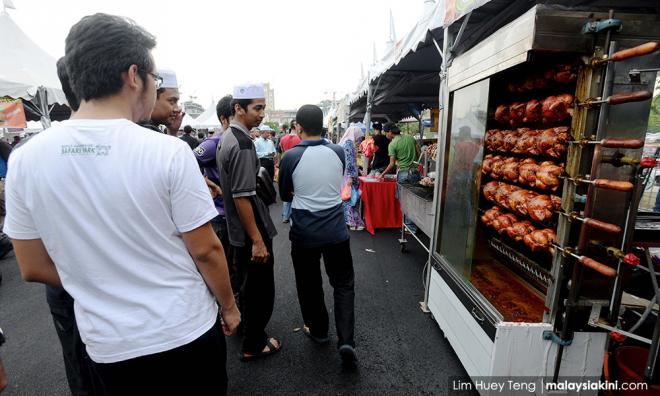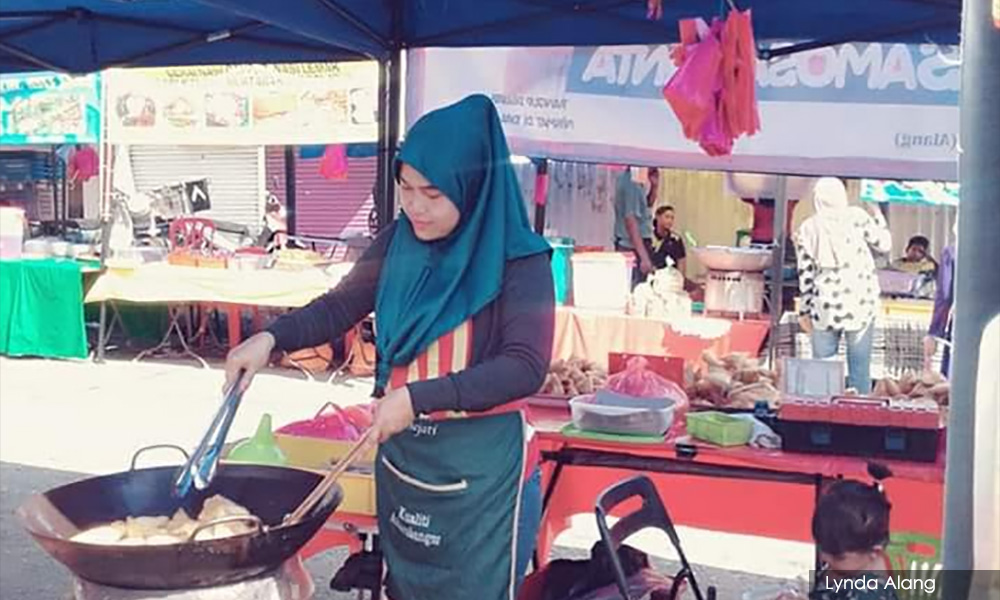
CORONAVIRUS | The cancellation of Ramadan bazaars nationwide as part of the movement control order (MCO) has hit hard on the traders trying to maximise their earnings during the forthcoming fasting month.
While there are traders hoping for the government to provide alternative ways for them to do business during Ramadan, others have gone to online social media to “open” their bazaars.
Checks by Malaysiakini revealed that many Ramadan bazaar groups representing various areas nationwide have emerged on Facebook, among them being Bazaar Ramadan Online Terengganu (Original) with 30,000 members at present; Bazaar Ramadan Online Muar (14,100 members); Bazaar Ramadhan Online Permaisuri & BTR (5,000 members) and many more.
Interestingly, these groups were set up during the MCO period between late March and early April, to enable traders to continue plying their business during the fasting month.
Tengku Ahmad Silmi Tengku Azizan (photo, below), who is known as Abang Bob and manages the Bazaar Ramadhan Online Permaisuri & BTR (Bandar Tun Razak) group, said he set up the group with the earnest intent to help his fellow traders who find it difficult to market their products for this Ramadan period.

The 45-year-old owner of Cik Melur restaurant at Bandar Sri Permaisuri said that he understood the problems faced by traders, especially petty traders, considering that he himself started at the bottom and has been constantly renting spots (tapak) at Ramadan bazaars since 20 years ago.
To launch the group’s activities, he prepared a special delivery system where the food deliverers can leave their telephone numbers, thus facilitating traders’ communication with them in relation to the delivery of food, following orders from customers.
“I definitely do not take any fees because I (seek to) make it easier for people to trade, (and) those who want to buy items, many are stuck.
“I did not realise that riders (food deliverers) also PM (personal message) to me, many say good, received many orders. He (the trader) definitely does not know where to find the riders,” Abang Bob told Malaysiakini when contacted.
In fact, Abang Bob also has come up with several unique attractions for his Ramadan bazaar group to stand out, among them by having a discount day that would see all traders lower their respective prices, to ensure their group stands out from other online trading services.
While admitting that his own business declined during the MCO, Abang Bob said he is still thankful because at least could still keep his restaurant doors open, unlike petty traders and stall operators who now have no income.
Only products related to fasting and Hari Raya are marketed
He monitors his group from time to time to ensure only products related to fasting and Hari Raya are marketed and to ensure that unrelated deliveries with unsuitable pictures and political in nature would be deleted.
Previously, Selangor and the Federal Territory proposed holding a Ramadan e-bazaar with the e-hailing concept that involves a central kitchen, to enable traders to continue doing business during Ramadan.
However, on April 16, Senior Minister (Security Cluster) Ismail Sabri Yaakob announced that all forms of physical Ramadan bazaars are not allowed to operate, even if it involves e-hailing.
Despite Selangor Menteri Besar Amirudin Shari the next day announcing that the state will still allow Ramadan e-bazaars to be held, traders were still confused and uncertain over the status of the Ramadan e-bazaars.
Meanwhile, Norhazlinda A Ghafar, who manages Bazaar Ramadhan Online Kuala Lumpur, said the group is getting more attention and that it now has 2,500 members since it was established on April 1.
Popularly known as Lynda Alang (photo, below), the 34-year-old who has been selling samosa at her Ramadan bazaar in Jalan Kuching and Taman Tenaga for 10 years, found the online bazaar to have allowed her business to expand, where the corn drinks she now also sells have received an encouraging response.

“Many. There are many (orders). To the extent that there is insufficient stock, not enough hands.
“The (corn drinks) agent also took many (orders from us), that customers also had no time to buy (the drinks),” she said, adding that many of the group’s traders are from Ampang and Cheras.
Lynda, who was also a perfume and cosmetic product seller, said that she had to close her shop since MCO was implemented, and now focuses on the selling of food products like samosa and the corn drink.
“It is free (to be a group member). Only that those (in the group) can only advertise food. Any other item advertised will be deleted,” she said.
For Azri Hatea, he joined Bazaar Ramadhan Shah Alam Online Official 2020 to promote laksa and iced tea drinks, after he was unable to open stalls at the bazaars at Seksyen 18 and Seksyen 13 in Shah Alam, as he used to do previously.
Different from other groups, the Shah Alam bazaar group, which was set up on March 31, asked its members to pay a RM50 annual fee, and deliveries will be coordinated by the operator. This group now has 9,300 members.
Aside from promoting the group, Azri, 36, also promotes his products on his personal FB account to ensure the continuity of his business, which has declined heavily during the MCO.
However, online trading may not be a medium that is easy for certain traders to depend on.
Among them are nasi ayam pasu trader Wan Liza, 47, who is a member of Bazar Ramadhan Online Warga Selayang 2020.
The 47-year-old admitted finding it difficult to promote her products online because she does not know how to do it.
“I am not so good at online promotion, because previously (I) conducted business at a shop.
“I cannot really say about reception because everyone also uses online, so why would (customers) want to believe in us when he/she does not know us, or about our food. I feel it is difficult,” Wan Liza said when contacted.
Besides the e-bazaars proposed by Selangor and the Federal Territory, other initiatives include the one by the Perlis state government, which allowed traders to do the business from their homes and road shoulders during Ramadan.

However, on April 15, Ismail (above) announced that the cabinet would come up with a new standard operating procedure (SOP) to standardise Ramadan bazaars at the state and federal levels.
When contacted by Malaysiakini, several mayors of cities and heads of municipalities in Selangor encouraged traders to come up with their own online trading initiatives, as long as the traders registered with the respective city and municipal councils.
In fact, there are city councils that have plans to begin their own e-hailing initiatives to assist Ramadan traders, such as the one revealed by Petaling Jaya City Council (MBPJ) mayor Mohd Sayuthi Bakar. - Mkini


No comments:
Post a Comment
Note: Only a member of this blog may post a comment.